Goals and constraints
We were hired to restore inbound lead flow for a US-focused B2B SaaS in oil and gas. The priority was not traffic volume but qualified demo requests and sales contacts from BOFU pages. With a constrained budget of $3.5k per month and no fixed deadline, speed to impact mattered. Our north star: get back to a stable cadence of at least 2 qualified inbound leads per month while stopping the 30% YoY organic decline.
Introduction
Throughout 2024, the site lost roughly 30% of organic traffic and saw inbound leads dip from about 2 per month to about 1 per month. In an industry with long sales cycles, one incremental qualified lead per month materially affects pipeline. We approached this challenge with a pragmatic, budget-aware sequence: fix the technical foundation, stop cannibalization, restore indexation, then build and reinforce BOFU landing pages, internal links, and CRO. We also adapted to lower CTR realities driven by AI Overview, aiming to win more of the right clicks and convert more of the sessions we already had.
Client context
The client is a B2B SaaS provider for oil and gas operators in the US, serving upstream and midstream use cases across production, land, scheduling, and accounting workflows. They operate globally but prioritize the US market and terminology. Content quality and domain validity were critical, so every high-stakes page was reviewed by three subject matter editors on the client side. The business goal was simple and concrete: restore lead flow to at least 2 per month as fast as possible, and stabilize organic performance back to baseline. Budget was finalized at $3.5k per month for all SEO work streams - technical, content, and link building.
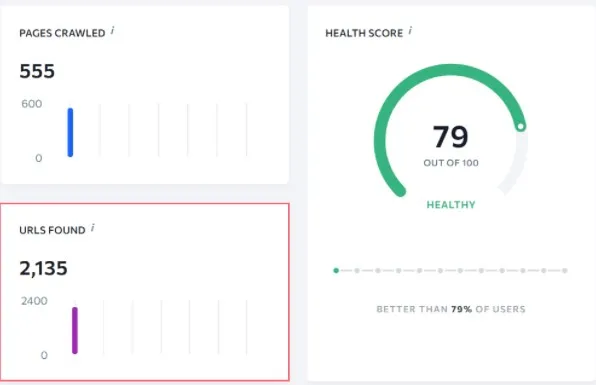
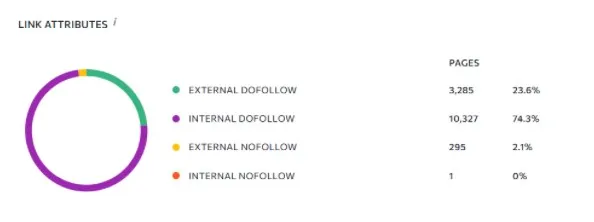

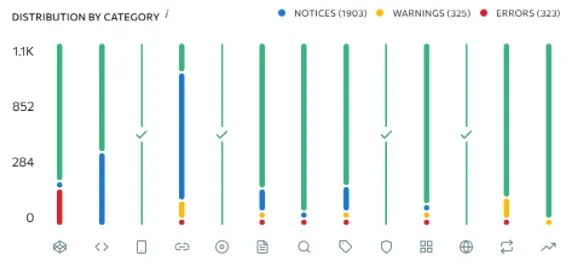
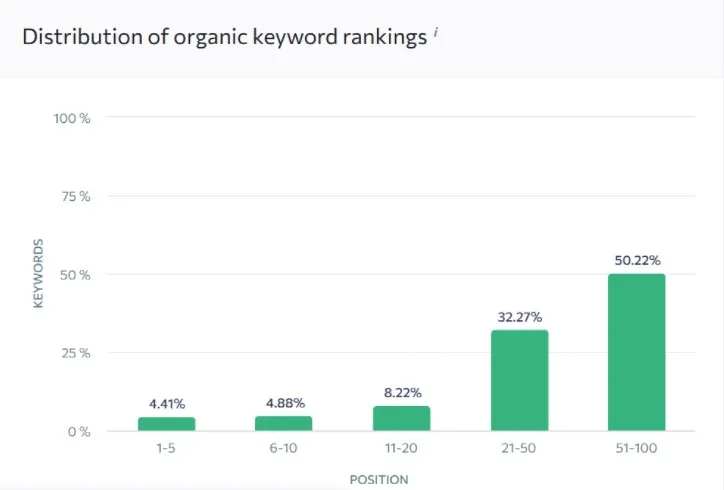
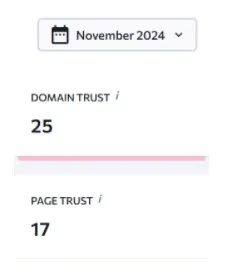
Strategy
We prioritized short time-to-impact actions that most directly influence indexation, relevance, and conversions. The sequence was intentional: fix what stops Google from understanding and trusting the site, consolidate signals on one URL per intent, then build BOFU landings that convert. Internal linking would transmit authority to commercial clusters, while link detox and selective acquisition would raise domain trust and stability through updates. Structured data and on-page FAQs would enrich snippets, and CRO would make every session count.
- Technical foundation - canonicalization, indexation, robots and sitemaps, CWV, schema
- De-cannibalization - one intent to one canonical URL, 301 consolidation
- BOFU landings - use cases, capabilities, integrations, and by-role pages
- Internal linking - hub structure and contextual links to pass equity to BOFU
- Link detox and targeted growth - remove noise, add trusted references
- CRO - sticky CTA, shorter forms, social proof, US tone of voice
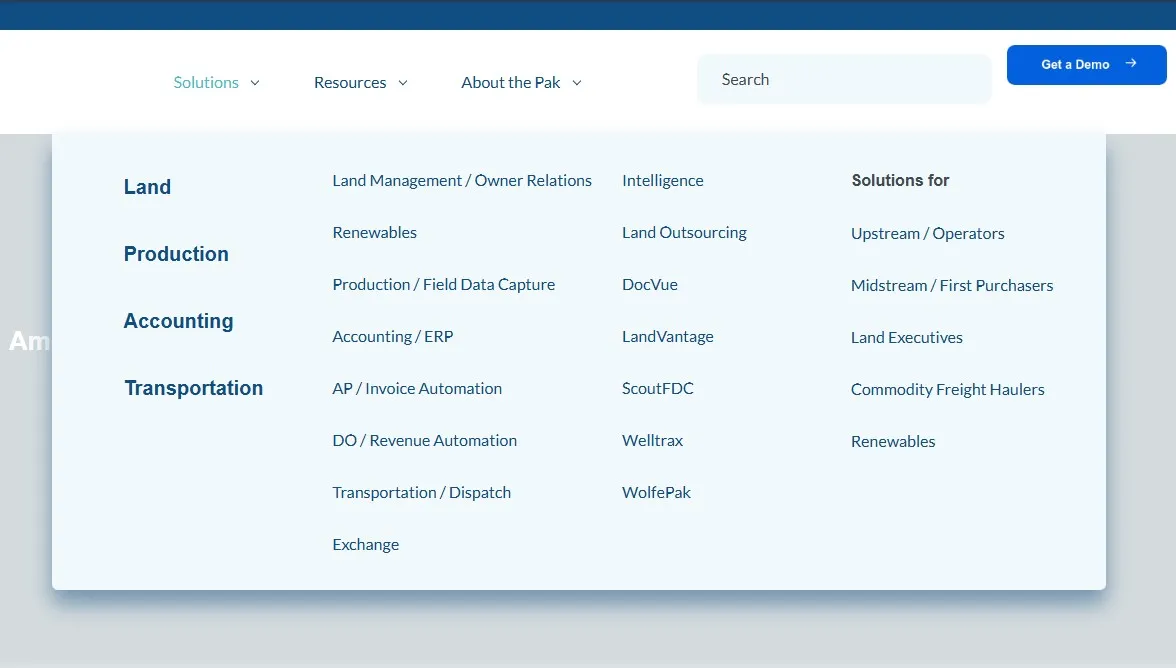
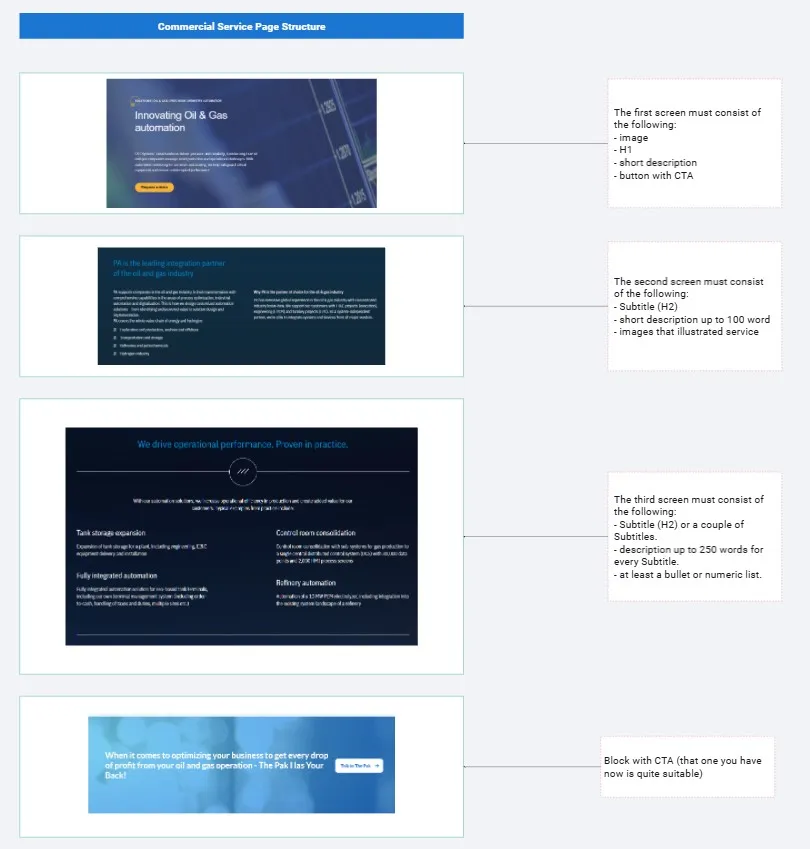

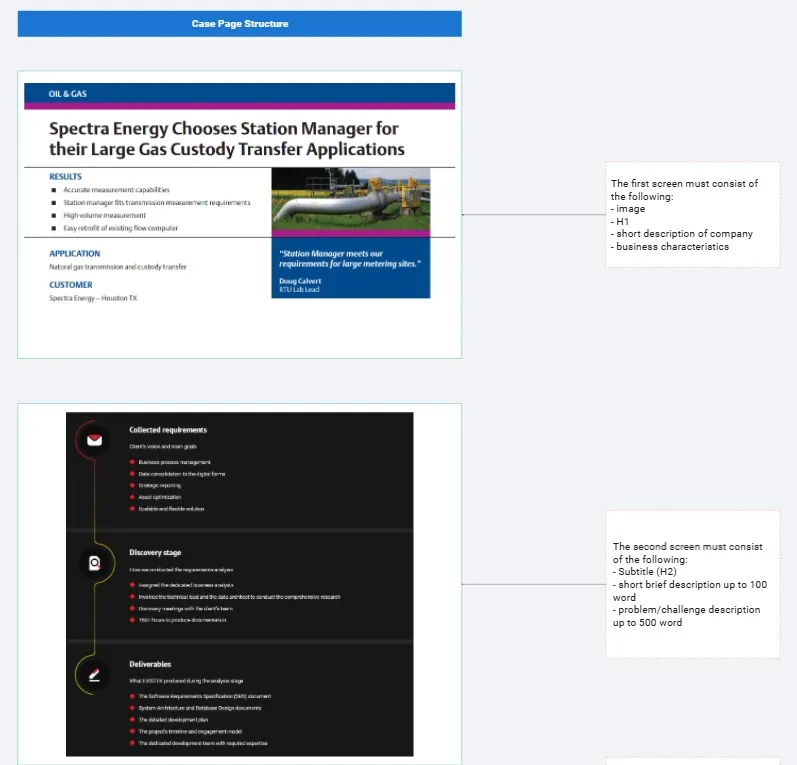

Execution
We executed in weekly sprints against a 30-60-90 backlog, reporting progress with transparent dashboards and tying every deliverable to lead-focused hypotheses. The toolset included GSC, GA4, crawling and audit tools, Ahrefs/Semrush, PSI/Lighthouse/CrUX, and schema validators. We validated key metrics across at least two sources, and provided a real-time Looker Studio dashboard.
Technical SEO and indexation. We unified protocols and hosts, normalized trailing slashes, fixed erroneous noindex and nofollow, templated canonicals, split sitemaps by type, and cleaned robots.txt. We resolved duplicate clusters and reduced parameterized URLs in crawl. CWV improved through lazy-loading, preloading critical assets, stabilizing media containers, and deferring render-blocking scripts. We added SoftwareApplication/Product, FAQ, and BreadcrumbList schema to empower rich results.
IA and BOFU content. We remapped the site around Solutions and Use-cases like Production Accounting, Pipeline Scheduling, Land Management, SCADA/Telemetry, and Regulatory Reporting, plus Capabilities, By Role, and Integrations. Every key page received an H1/Title aligned to its cluster, clear UVP, proof, and FAQs. Each critical page underwent review by three SME editors on the client side to ensure domain accuracy and compliance with US terminology and regulations.
Internal linking. We implemented hubs for Solutions, Use-cases, and Integrations, introduced Related modules on templates, and added contextual links from MOFU and blog posts to BOFU, supported by breadcrumbs. As a result, approximately 90.5% of pages now receive internal dofollow links, creating a coherent, crawl-friendly network that concentrates signals on commercial pages.
Links. We detoxed the profile by removing broken references, disavowing toxic domains, evening out anchor mixes, and pacing acquisition. We then added relevant, high-quality mentions across industry-relevant placements, guest features, and reputable communities. Net impact: +69 referring domains and +546 backlinks during the focal period, with the current profile near 367 RD and 2.7K BL.
CRO. We elevated the primary CTA to the first screen, added sticky header CTA, reduced form fields, clarified what prospects get on a demo, and surfaced social proof like client logos, certifications, and case highlights. This improved conversion rates even as CTR across SERP compressed due to AI Overview.
Measurement and governance. We triangulated GSC and GA4 for performance and conversions and validated rankings via external trackers. We provided ongoing visibility via a Looker Studio report that unified these sources.
Open the live dashboard in Looker Studio
Results
Visibility accelerated while intent quality improved. In Google Search Console, impressions rose from 132k to 378k, with average position improving from 35.1 to 31.3. The share of Top-10 keywords nearly doubled from 9.29% to 18.12%. CTR declined from 4.5% to 1.2% - consistent with AI Overview dynamics - yet lead-driving GA4 events increased, validating the pivot toward BOFU and CRO. Indexation expanded to about 1,600 valid URLs after removing systemic blockers. The BOFU benchmark page for land management emerged as the number two page in the portfolio by traffic share, moving from roughly 5.58% to 8.3% - a relative gain of about 49%. Technical health improved meaningfully: 315 critical issues fixed, Health Score up to 86, healthy pages up from 167 to 580, and pages with issues down from 384 to 139.
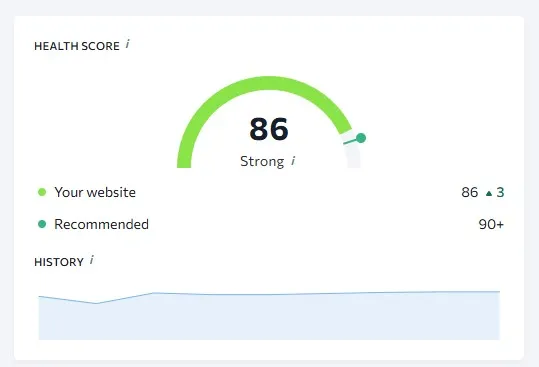


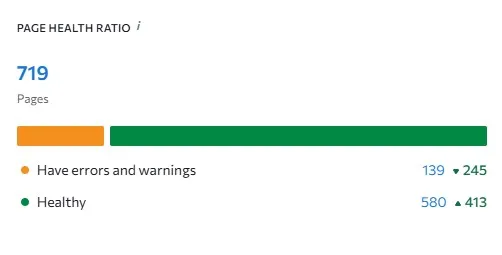

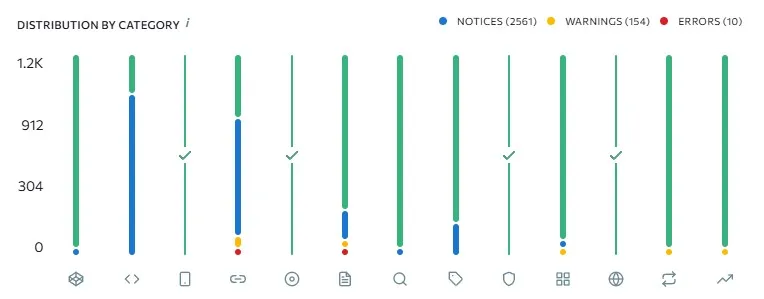
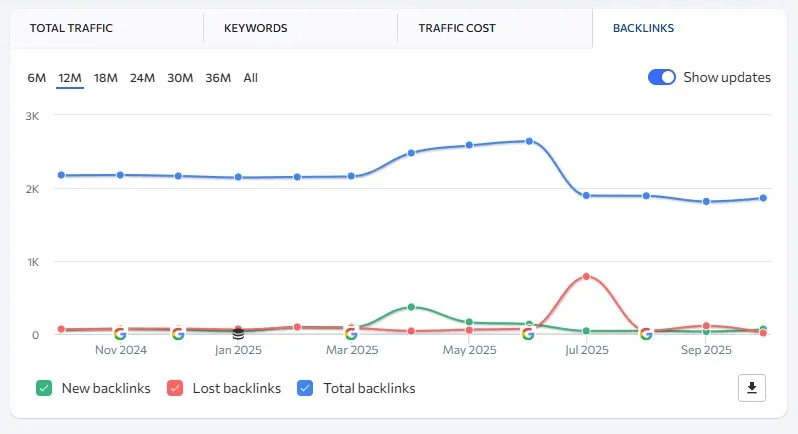

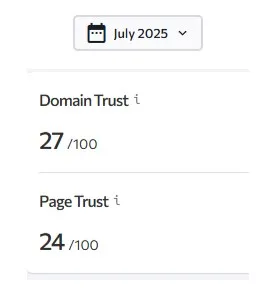
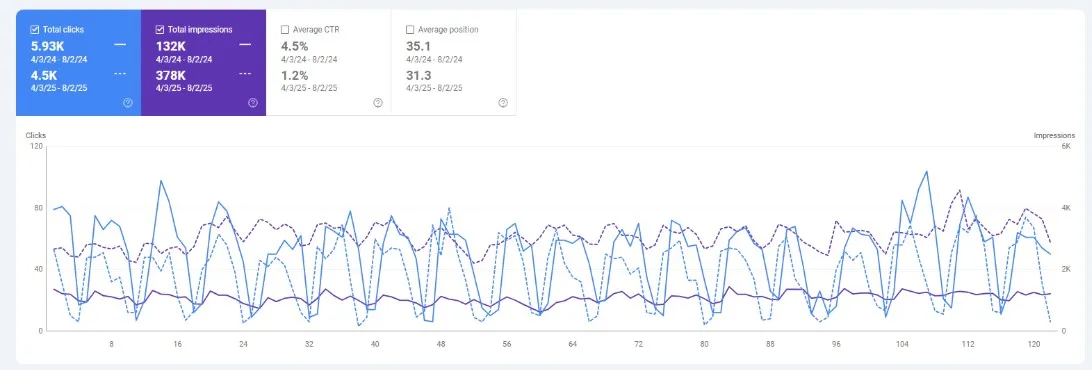
What changed and why it worked
- Problem: Indexation losses, duplicates, and mixed signals. Hypothesis: Canonicalization and sitemap-robots hygiene will restore the core. Action: Template canonicals, 301 consolidations, clean sitemaps, fix noindex/nofollow. Outcome: More valid pages indexed and improved average position.
- Problem: Cannibalized commercial queries. Hypothesis: One intent to one URL will lift primary landings. Action: Merge duplicates, redirect to canonical, revise navigation and internal links. Outcome: Top-10 share rose from 9.29% to 18.12%.
- Problem: TOFU overweight and weak BOFU conversion. Hypothesis: BOFU landings convert fastest on a limited budget. Action: Build and optimize use cases, capabilities, by-role, and integrations. Outcome: Lead-driving events increased and /land grew its share by ~49%.
- Problem: Lower CTR due to AI Overview. Hypothesis: Rich snippets and CRO will recover more value from fewer clicks. Action: SoftwareApplication/Product and FAQ schema, sticky CTA, shorter forms, social proof. Outcome: Despite CTR drop to 1.2%, GA4 form events rose.
- Problem: Weak internal equity flow. Hypothesis: Hubs and contextual links will align relevance and authority. Action: Solutions/use-cases/integrations hubs, breadcrumbs, related modules. Outcome: Approximately 90.5% of pages with internal dofollow links.
- Problem: Link profile noise and trust gaps. Hypothesis: Detox plus targeted acquisition will stabilize rankings. Action: Disavow toxic domains, normalize anchors, add high-relevance links. Outcome: +69 RD and +546 BL, better stability through updates.
- Problem: US market fit and terminology. Hypothesis: US signals and SME review will increase intent match and trust. Action: US tone, compliance and regulatory context, SME-reviewed content. Outcome: Higher relevance for core US ICP and improved conversion behavior.
Lessons and next steps
Three levers delivered outsized returns within a $3.5k monthly constraint. First, restoring indexation and consolidating signals was non-negotiable - without it, content and links do not scale. Second, BOFU-first content combined with CRO won more from every visit, critical in a zero-click landscape. Third, detoxed and relevant links provided the authority and crawl frequency needed for stability and sustained growth.
Next steps we recommend:
- Scale the BOFU playbook beyond land management to production accounting, pipeline scheduling, SCADA/telemetry, and regulatory reporting clusters with the same IA, schema, and CRO patterns.
- Expand integrations pages targeting vendor-specific queries to reduce compatibility friction and create additional high-intent entry points.
- Layer focused MOFU guides that hand off to BOFU landings via contextual CTAs, strengthening semantic coverage without diluting commercial focus.
- Continue link acquisition from authoritative industry sources while monitoring toxicity and anchor distribution each month.
- Iterate CRO with session replay insights, form analytics, and role-based proof to further increase form_start and form_submit rates.
- Maintain weekly crawl-health checks, monthly GSC reviews, and quarterly IA audits to preempt regressions and keep the index clean.
The bottom line: visibility grew, intent quality improved, and the site now consistently supports the primary business outcome - a reliable return to at least 2 inbound leads per month - with a stronger foundation to scale beyond that.

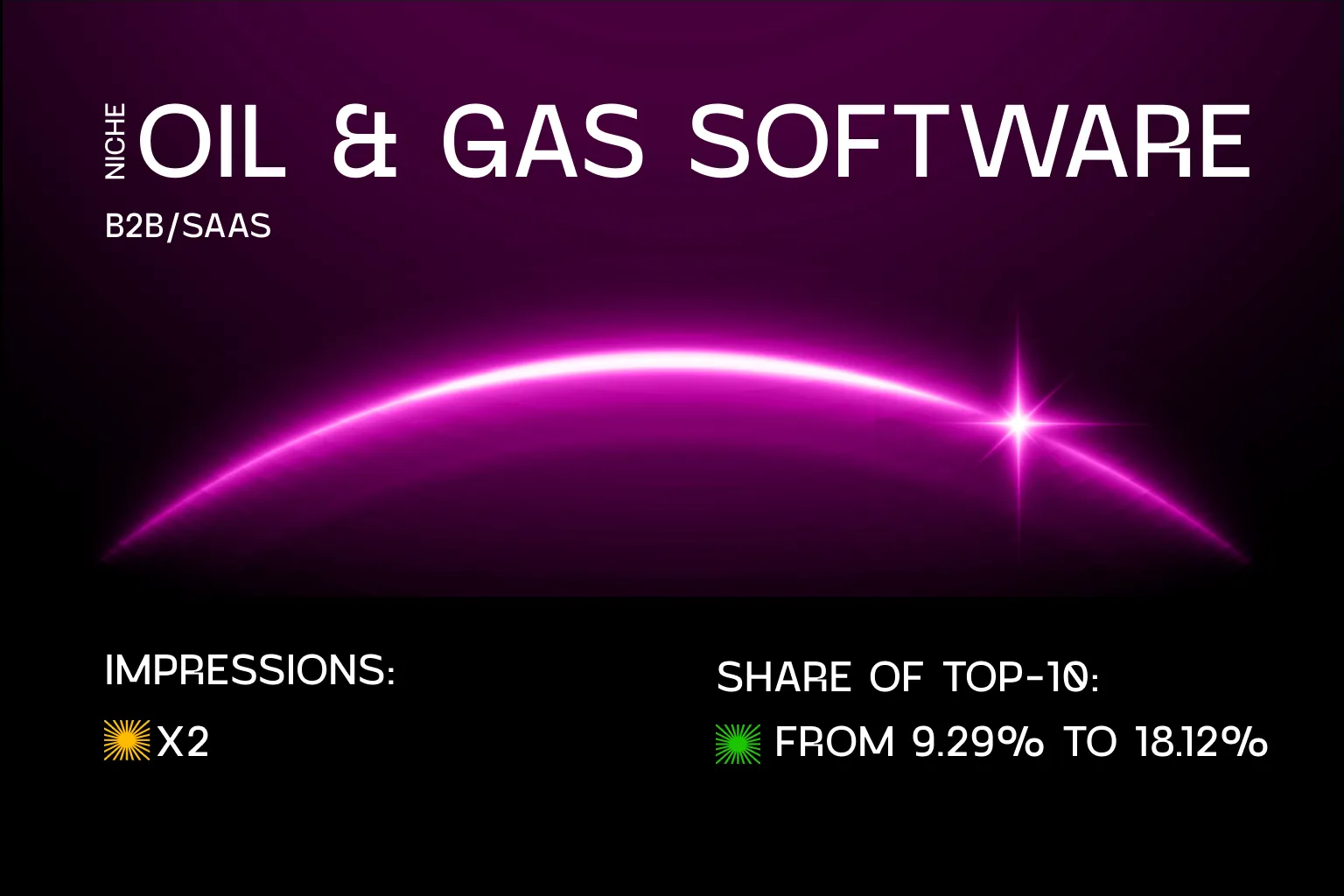


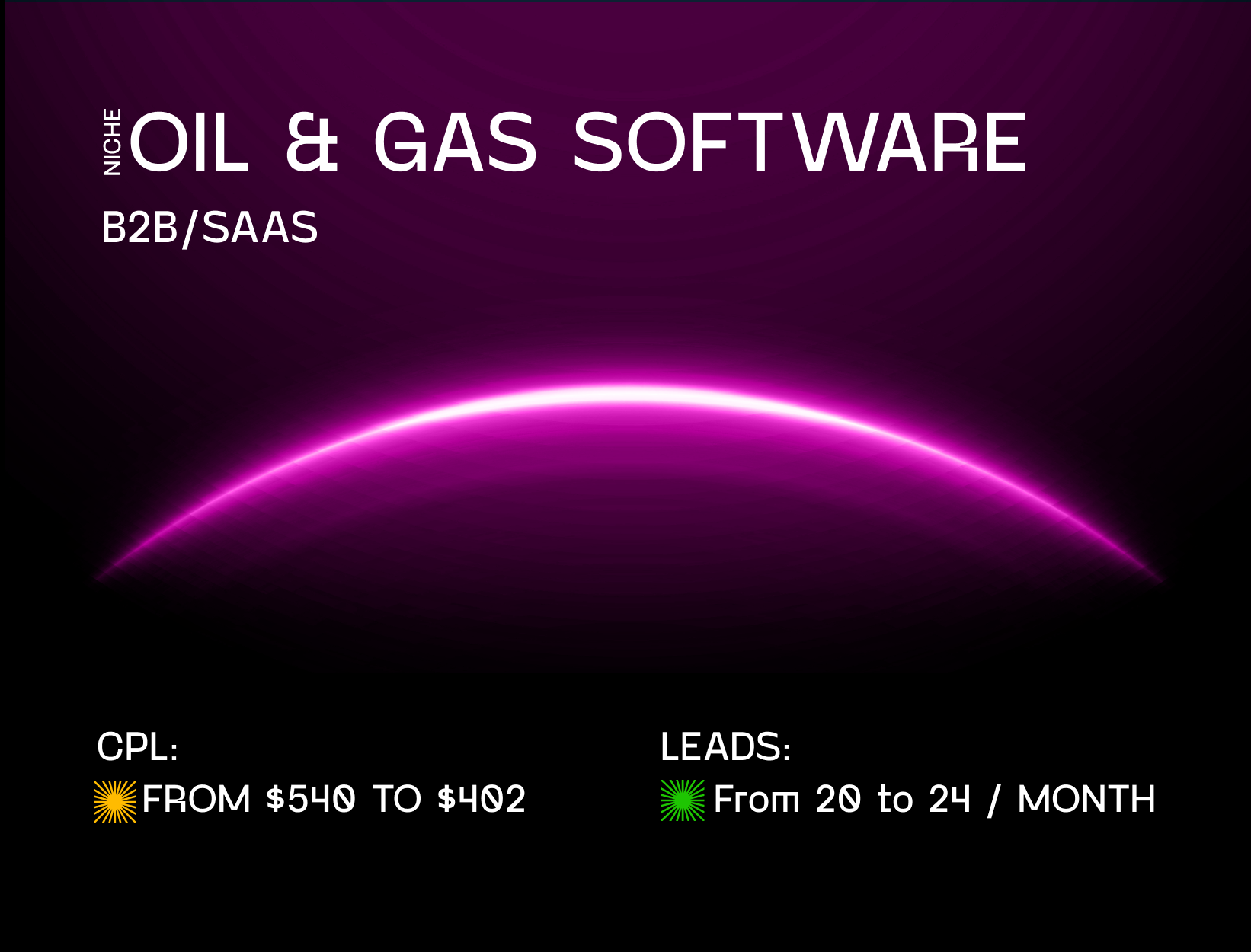
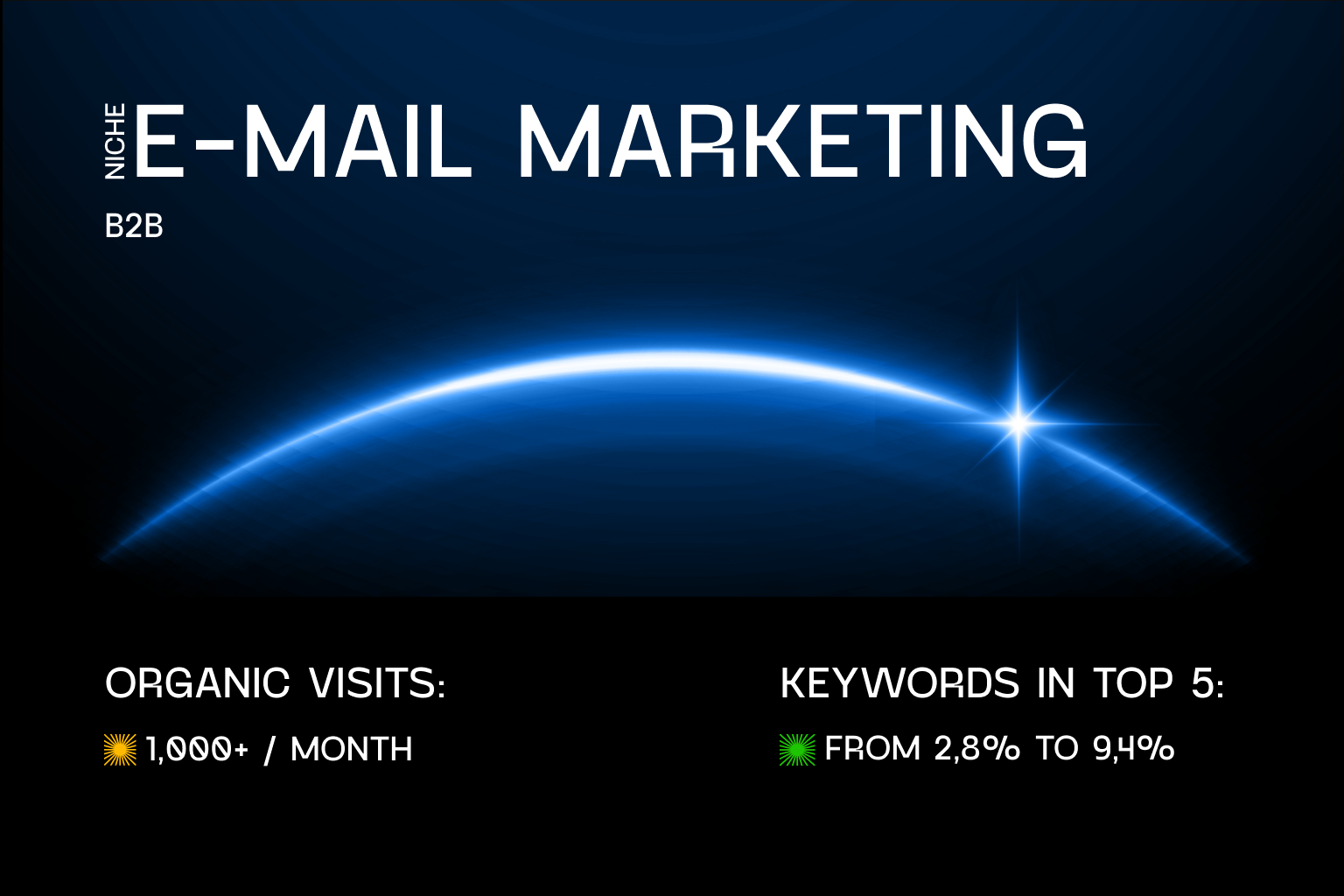
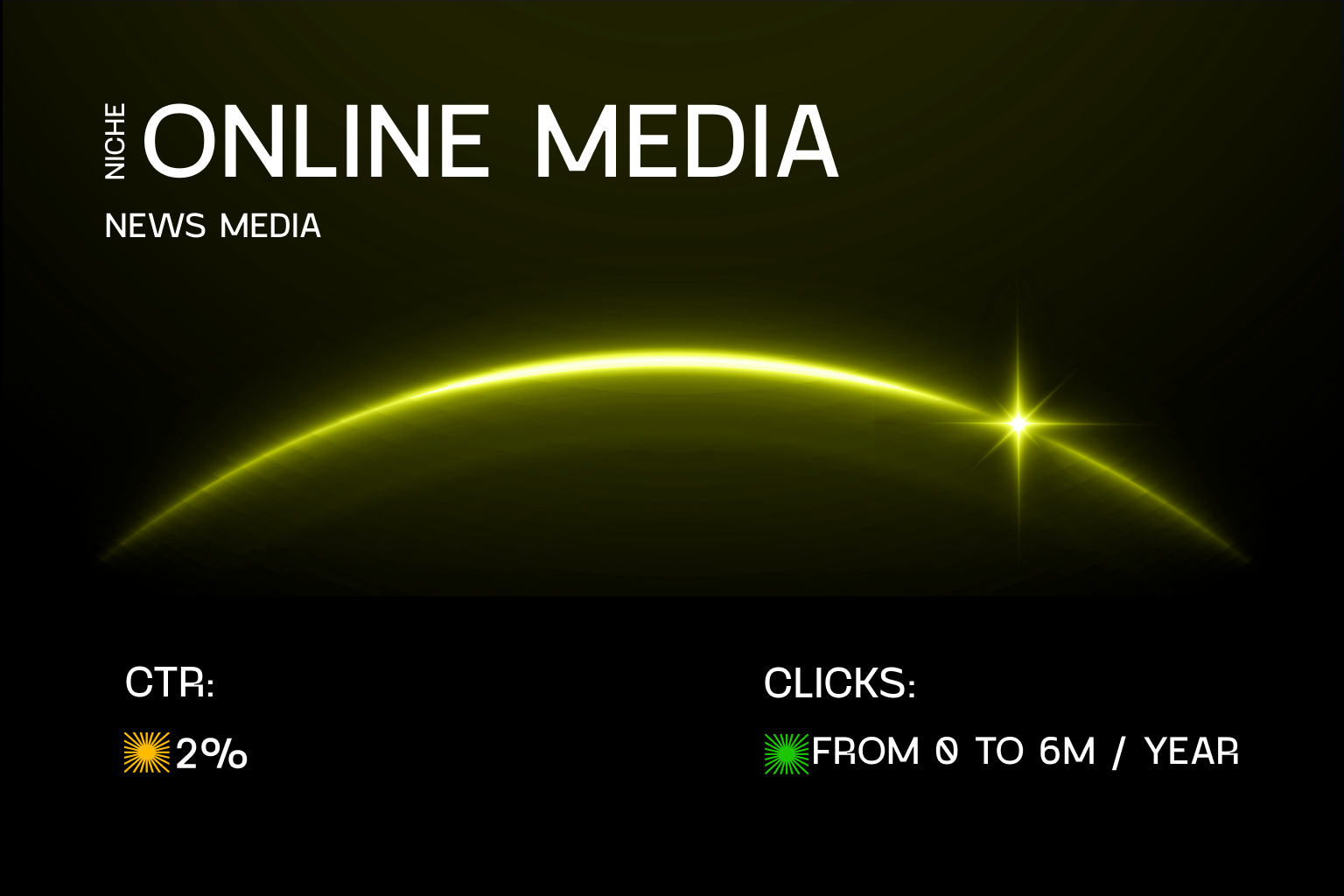
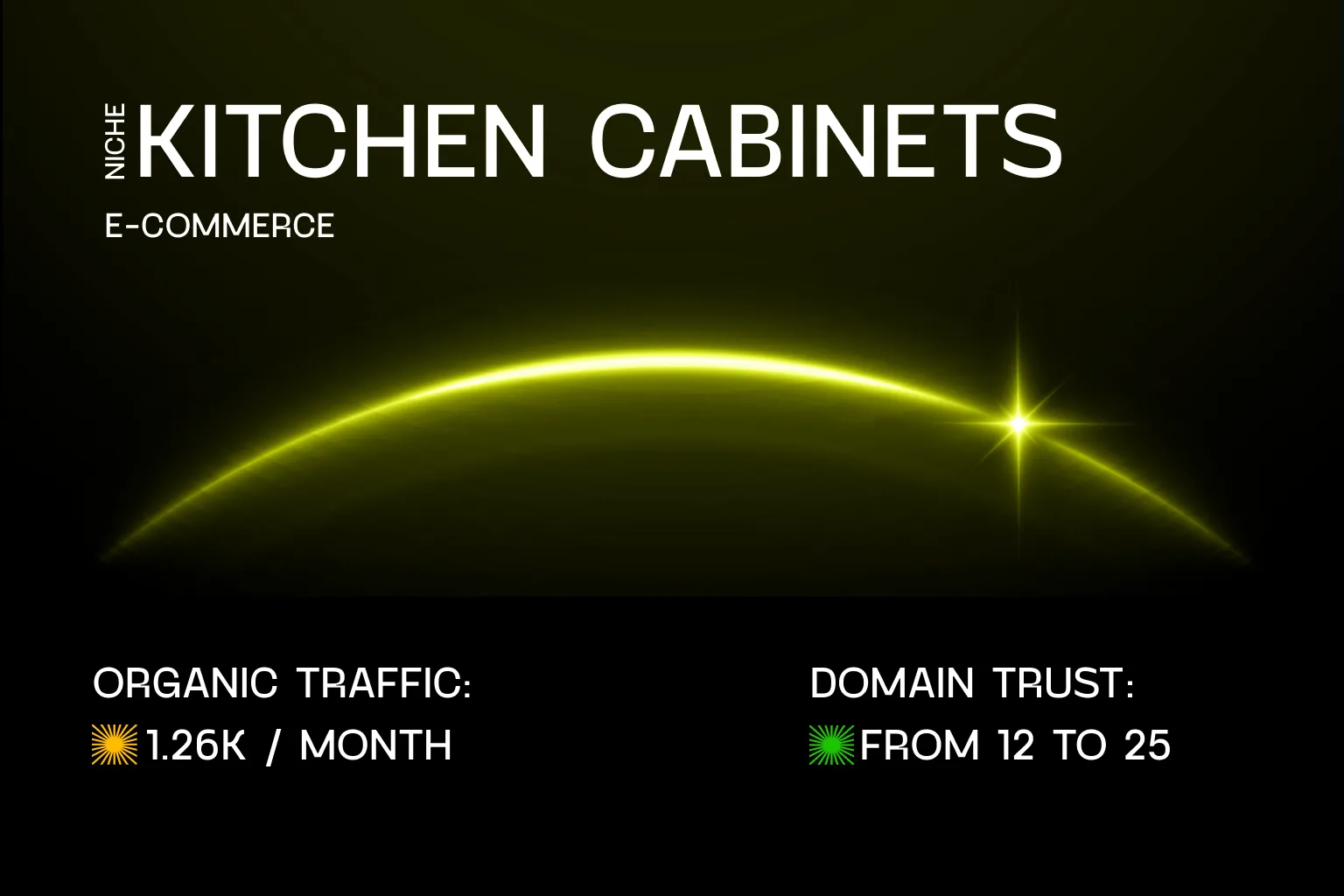
.svg)